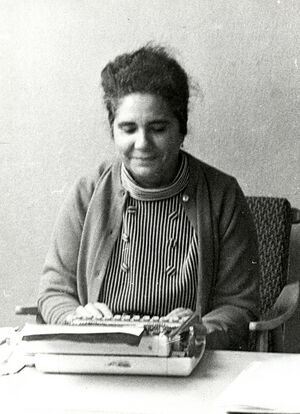Difference between revisions of "Elena Lacková"
| Line 1: | Line 1: | ||
| + | [[Image:Elena_Lackova.jpg|thumb|300px]] | ||
| + | |||
'''Elena Lacková''' (born Doktorová, 22 March 1921, Veľký Šariš - 1 January 2003, Košice) was a Slovak writer and playwright, author of literature for children and youth. | '''Elena Lacková''' (born Doktorová, 22 March 1921, Veľký Šariš - 1 January 2003, Košice) was a Slovak writer and playwright, author of literature for children and youth. | ||
| Line 22: | Line 24: | ||
==Links== | ==Links== | ||
| + | |||
| + | * [https://www.rommuz.cz/cs/o-muzeu/aktuality/2021-03-22-100-vyroci-narozeni-eleny-lackove/ 100. výročí narození Eleny Lackové], Muzeum romské kultury | ||
| + | |||
* [https://sk.wikipedia.org/wiki/Elena_Lacková Wikipedia-SK] | * [https://sk.wikipedia.org/wiki/Elena_Lacková Wikipedia-SK] | ||
Latest revision as of 14:35, 8 December 2023
Elena Lacková (born Doktorová, 22 March 1921, Veľký Šariš - 1 January 2003, Košice) was a Slovak writer and playwright, author of literature for children and youth.
Born in 1921 in Veľký Šariš, Czechoslovakia (today Slovakia), Elena Lacková was raised in a settlement of Romani people—a historically oppressed European ethnic group of Indian origin. Although she was unable to pursue higher education due to anti-Romani laws, Lacková became a talented writer of her own accord, penning poems by moonlight as the only girl out of the 600 children in her settlement with the ability to read.
In 1939, Nazi Germany invaded Czechoslovakia and persecuted its Romani settlements as part of the regime’s Roma Holocaust. Lacková survived these atrocities and became determined to reinvigorate Roma pride through theatre. Her first published work of literature—a play entitled Horiaci cigánsky tábor [The Gypsy Camp Is Burning] (1947)—depicted the collective hardships of the Romani people during the Holocaust, while providing a new perspective into their culture.
Lacková’s work continually uplifted the Romani community through literary mediums such as short stories, fairy tales, and radio plays. In 1970, she achieved yet another milestone as the first Romani woman in Czechoslovakia to graduate from university. A pioneer who received countless accolades, Lacková became the first Romani woman to receive one of Slovakia’s highest honors, the Order of Ľudovít Štúr III, awarded in 2001.
Works[edit]
- Cigánsky tábor; hra o 3 dejstvách, 4 obrazoch, Prague: Československé divadelní a literární jednatelství, 1956, 53 pp. A play written in 1946 and the performances took part - with a big success - in Czechoslovakia between 1948-1950. In total, there was 106 performances. (Slovak)
- Rómske rozprávky (Romane paramisa), ills. Eduard Weiss, Košice: Východoslovenské vydavateľstvo, 1992, 93 pp. (Slovak)/(Romani)
- Romské pohádky / Romane paramisa, trans. Jaroslav Balvín, Prague: Radix, 1999, 134 pp. (Czech)/(Romani)
- Narodila jsem se pod šťastnou hvězdou, ed., trans. & forew. Milena Hübschmannová, Prague: Triáda, 1997, 270+[8] pp; 2nd ed., 2002, 270+[8] pp; repr., 2010. [1]. Reviews: Robert Krumphanzl (Romano dzaniben), Clovek a spolocnost. (Czech)
- Ilona Lacková, A False Dawn: My Life as a Gypsy Woman in Slovakia, trans. Carleton Bulkin, Hatflield: University Of Hertfordshire Press, and Paris: Centre de recherches tsiganes, 2000, 224 pp. Review: Sadílková. (English)
- Ilona Lackova, Je suis née sous une bonne étoile: ma vie de femme tsigane en Slovaquie, trans. Milena Hübschmannová, Paris: Harmattan, 2000, 240 pp. Review: Ribier (Quartmonde) (French)
- Szerencsés csillagzat alatt születtem: egy cigányasszony élete Szlovákiában, trans. László Holka, Budapest: Pont, and Paris: Centre de recherches tsiganes, 2001, 220 pp. (Hungarian)
- Rođena sam pod sretnom zvijezdom: moj život Ciganke u Slovačkoj, trans. Igor Grbić, Zagreb: Ibis grafika, 2002, 245 pp. (Croatian)
- Narodila som sa pod šťastnou hviezdou, trans. Júlia Choleva Vrábľová, Bratislava: BRAK, 2023, 344 pp. Book launch. Publisher. (Slovak)
Links[edit]
- 100. výročí narození Eleny Lackové, Muzeum romské kultury
